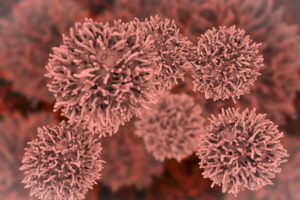
The Center for Oncoendocrinology at Brigham and Women’s Hospital was established to provide expert endocrine care for cancer patients during and after treatment. Endocrinologists at the Center, a program of Dana-Farber/Brigham and Women’s Cancer Center, can provide specialized knowledge of endocrine issues that may affect your cancer patient.
“We aim to reduce the impact of endocrine disease by providing specialized care for this patient population, and investigating the best approaches for prevention, diagnosis, and treatment,” said Ole-Petter Riksfjord Hamnvik, MB, BCh, BAO, MMSc, an endocrinologist within the Division of Endocrinology, Diabetes and Hypertension at BWH, and director of the Center for Oncoendocrinology.
The Center evaluates and manages patients with with cancer who are affected by a wide range of endocrine conditions, either during the active phase of their cancer treatment or during long-term follow-up. Approximately 75 percent of the referred patients are undergoing active cancer treatment when they are referred to the clinic, whereas the remaining 25 percent are long-term cancer survivors. Acute endocrine complications of cancer therapies include thyroid disease in patients receiving immunotherapy, or high blood sugar in patients treated with steroids. Endocrine complications that are seen in the longer term include adrenal insufficiency from prolonged steroid treatment, osteoporosis from breast cancer treatment, or an underactive thyroid or thyroid nodules as a result of radiation for Hodgkin’s lymphoma.
“We have developed an expertise in endocrine complications from immunotherapy treatments. Patients who respond well to certain immunotherapy drugs, such as nivolumab or pembrolizumab, sometimes develop endocrine conditions, such as thyroiditis, hypophysitis, hypothyroidism, or adrenal insufficiency. We have also seen an increasing number of patients with type 1 diabetes as a result of immunotherapy,” said Dr. Hamnvik.
The Center for Oncoendocrinology relies on clinical expertise within BWH, collaborating with the Thyroid Nodule and Tumor Clinics, Center for Adrenal Disorders and the Pituitary/Neuroendocrine Program. The Center works closely with endocrine surgeons who perform over 600 thyroid surgeries annually.
In collaboration with Le Min, MD, PhD, the Center for Oncoendocrinology is recruiting patients for clinical trials that investigate immune responses in patients who develop autoimmune endocrine diseases during immunotherapy treatment. The Center also works collaboratively with Dana-Farber Cancer Institute oncologists to provide endocrine expertise to clinical investigation of new cancer drugs.
“We also provide educational support to physicians to ensure timely referrals and improved communication among care providers. We respond to questions from oncologists about the results of endocrine tests, and consult with pharmacies, phlebotomy and laboratory services about endocrine medications and endocrine tests,” said Dr. Hamnvik.
The Oncoendocrine Program is also collaborating with clinicians at Mount Sinai Hospital in New York and MD Anderson to identify risk factors for cancer patients who develop endocrine complications, and understand whether immunotherapy-induced type 1 diabetes differs from the classical disease.
Dr. Hamnvik’s paper, Thyroid Dysfunction from Antineoplastic Agents, published in The Journal of the National Cancer Institute (2011), is used regularly by oncologists to determine how often they should conduct thyroid tests and how to the interpret the results.
The Center for Oncoendocrinology also trains endocrinologists in the care of oncology patients, both by providing training to experienced clinicians who want to learn more about the advances in the field of oncoendocrinology, and by exposing the endocrinology fellows at Brigham and Women’s Hospital to a broad spectrum of endocrine disease in the cancer patient.
If you would like to refer a patient to the Center, please call (617) 632-4523.